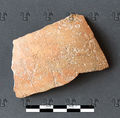EN-1
| Inscription | |
|---|---|
| Transliteration: | aχ[? |
| Original script: | ] |
|
| |
| Object: | EN-1 potsherd (pottery) |
| Position: | outside |
| Script: | North Italic script |
| Direction of writing: | ambiguous |
| Number of letters: | 3 |
| Number of lines: | 1 |
| Craftsmanship: | incised before firing |
| Current condition: | damaged, fragmentary |
| Archaeological culture: | La Tène A, La Tène B [from object] |
| Date of inscription: | first half of the 5th–middle of the 3rd centuries BC [from object] |
| Date derived from: | archaeological context, typology [from object] |
|
| |
| Language: | unknown |
| Meaning: | |
|
| |
| Alternative sigla: | none |
| Sources: | Schumacher 2004: 195, 217 |
Images
|
Object EN-1 potsherd with inscription EN-1.
|
Inscription EN-1.
|
Object EN-1 potsherd with inscription EN-1.
|
Inscription EN-1.
|
Commentary
First published in Risch 1984: 29.
Further references: Risch 1989: 1580.
Picture in Risch 1984: 28, Abb 9 (drawing = Risch 1989: 1586, fig. 7 = Schumacher 2004: Taf. 5,4).
Although the lower part of the letters is missing, ![]() and
and ![]() (curiously small (or offset?) in comparison) can be indentified. The scratch to the very left is definitely intentional and must be the remains of another letter.
(curiously small (or offset?) in comparison) can be indentified. The scratch to the very left is definitely intentional and must be the remains of another letter.
Risch 1989 argues that the sherd plus inscription, together with some more typically Raetic objects with scratchings found at Ardez and Scuol/Schuls, belongs in Frizens-Sanzeno-context and should therefore be considered part of the Raetic corpus. Pellegrini 1985: 98, n. 14 remains sceptical. As, archaeologically, the site lies in an area of interference between a number of cultural horizons considered Raetic and/or Celtic, an attribution to Raetic is not unassailable. The two identifiable letters are not quite decisive palaeographically: ![]() is rarer, but does occur in Lepontic;
is rarer, but does occur in Lepontic; ![]() is typically Raetic only when read sinistroverse – as a dextroverse character it occurs in archaic Lepontic inscriptions. The remaining scratch left of a third letter looks like part of a curve, which in this orientation would be hard to account for in Raetic, but might be dextroverse rounded
is typically Raetic only when read sinistroverse – as a dextroverse character it occurs in archaic Lepontic inscriptions. The remaining scratch left of a third letter looks like part of a curve, which in this orientation would be hard to account for in Raetic, but might be dextroverse rounded ![]() or even a Lepontic Omikron. Generally speaking, properly inscribed pottery (as opposed to quasi-script scratchings on Sanzeno bowls and the like) is characteristic of the area west of the river Etsch/Adige; those finds are usually assigned to the Lepontic corpus. The northernmost Lepontic finds from Graubünden, however, are two gravestones (GR·1 and GR·2), neither one from the Engadin.
or even a Lepontic Omikron. Generally speaking, properly inscribed pottery (as opposed to quasi-script scratchings on Sanzeno bowls and the like) is characteristic of the area west of the river Etsch/Adige; those finds are usually assigned to the Lepontic corpus. The northernmost Lepontic finds from Graubünden, however, are two gravestones (GR·1 and GR·2), neither one from the Engadin.
Bibliography
| LIR | Alberto Mancini, Le Iscrizioni Retiche [= Quaderni del dipartimento di linguistica, Università degli studi di Firenze Studi 8–9], Padova: Unipress 2009–10. (2 volumes) |
|---|



